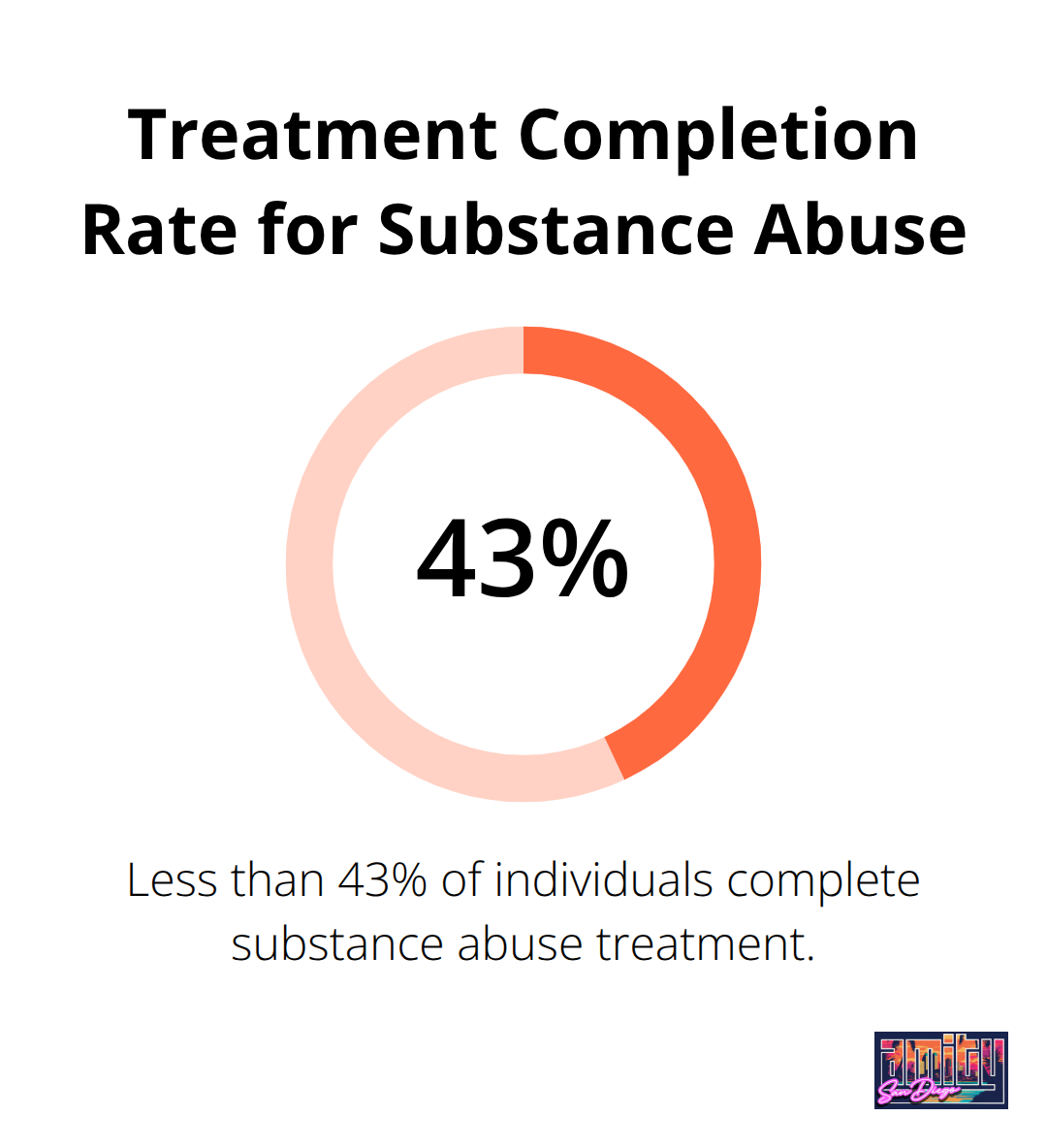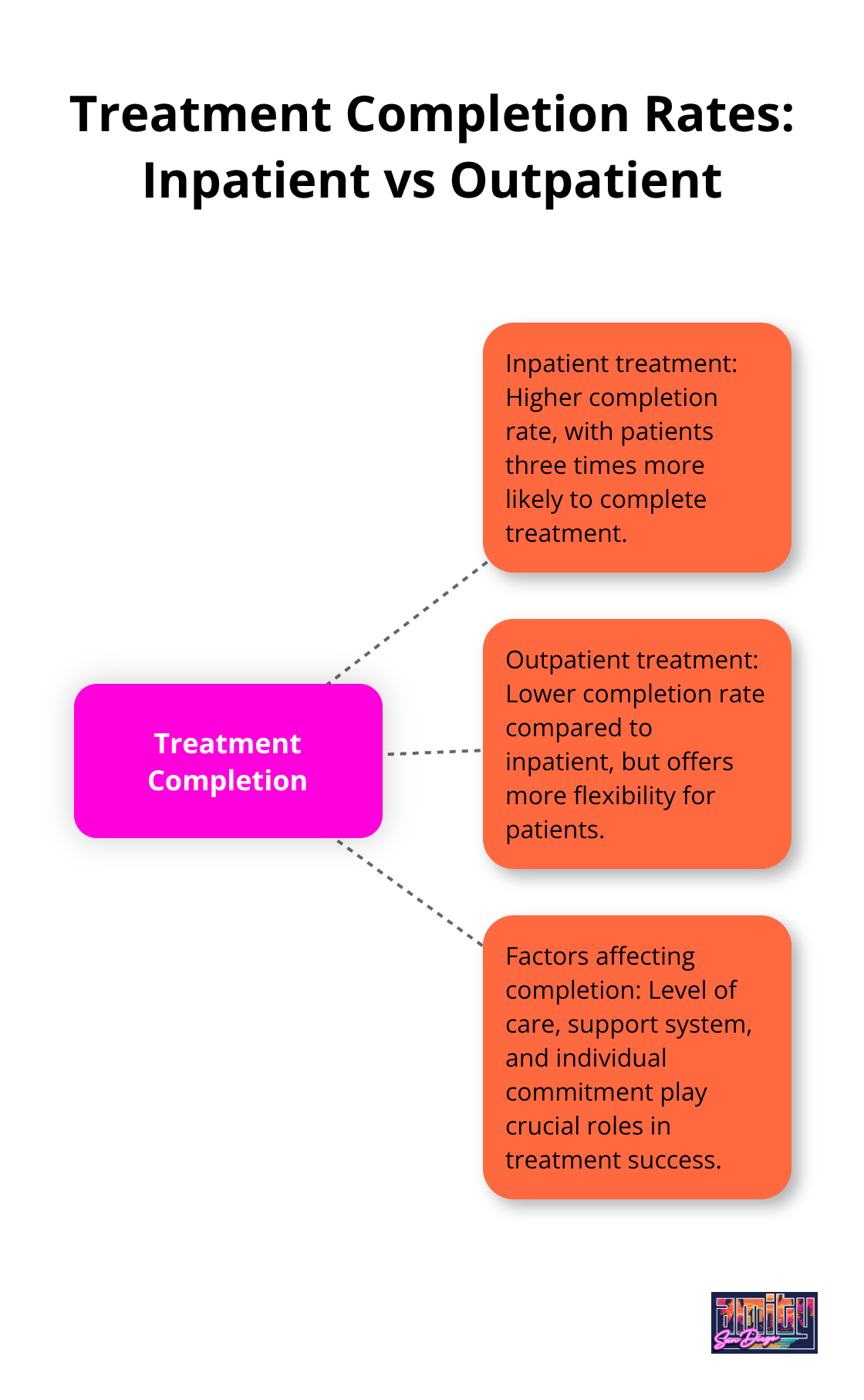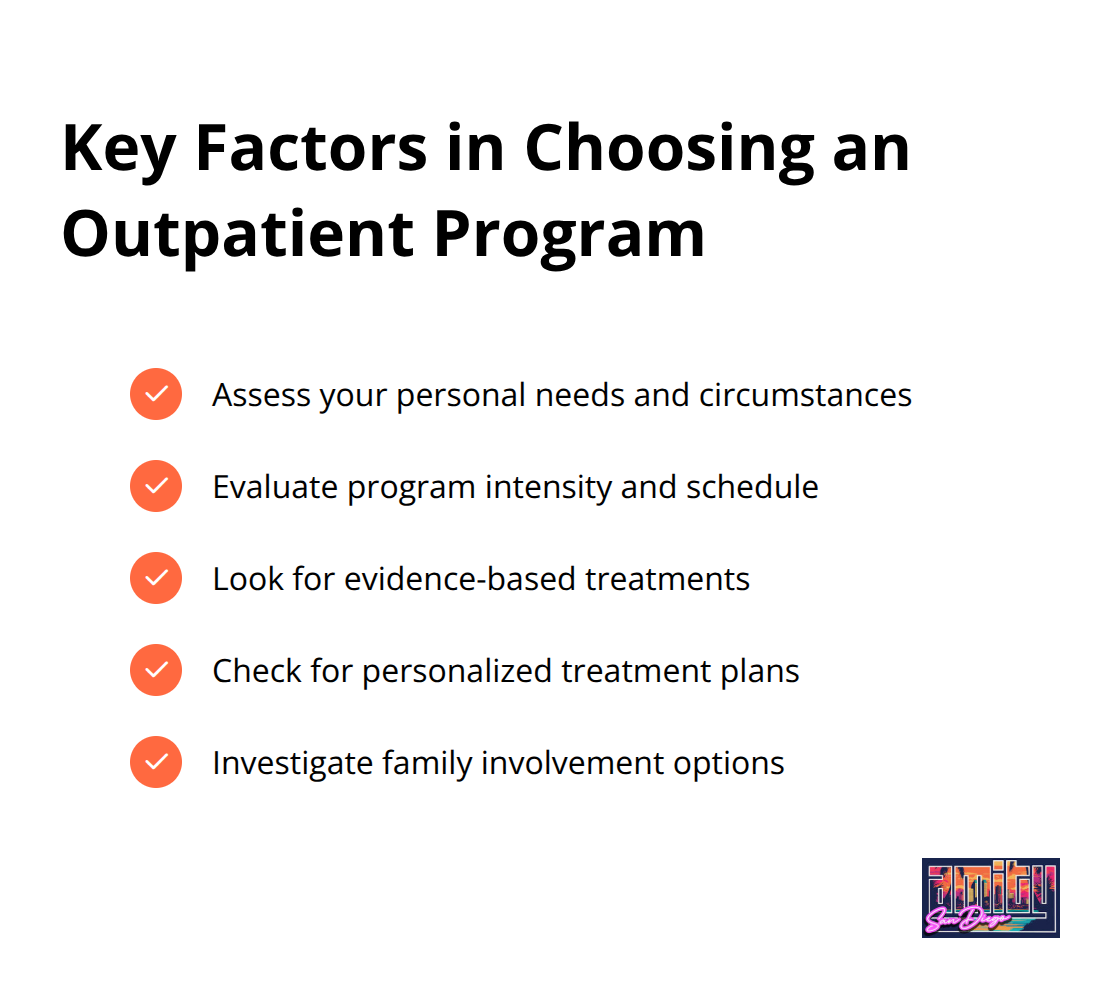At Amity San Diego, we understand the challenges of overcoming substance abuse. Outpatient substance abuse treatment programs offer a flexible and effective approach to recovery.
These programs allow individuals to receive professional care while maintaining their daily responsibilities. We’ll explore the various options available and help you find the right path to lasting sobriety.
What Is Outpatient Substance Abuse Treatment?
Definition and Types
Outpatient substance abuse treatment provides professional care for addiction recovery while allowing individuals to maintain their daily responsibilities. At Amity San Diego, we offer various outpatient programs tailored to meet each client’s unique needs.
Outpatient programs come in different intensities:
- Intensive Outpatient Programs (IOPs): These are an important part of the continuum of care for alcohol and drug use disorders.
- Partial Hospitalization Programs (PHPs): PHPs offer more intensive care, often requiring 20-30 hours per week.
- Standard Outpatient Programs: These are less intensive, usually involving 1-2 sessions per week.
Outpatient vs. Inpatient Treatment
The main difference between outpatient and inpatient treatment lies in the level of care and time commitment. Inpatient treatment requires 24/7 residence at a facility, while outpatient programs allow clients to live at home. This flexibility makes outpatient treatment a popular choice for those with work or family obligations.
Substance Abuse and Mental Health Services Administration reports that less than 43% of individuals who enter treatment for drug and alcohol use complete it. This statistic highlights the importance of choosing the right treatment option.

Benefits of Outpatient Treatment
Outpatient treatment offers several advantages:
- Affordability: It’s generally more affordable than inpatient care.
- Real-world application: Outpatient treatment allows individuals to practice recovery skills in real-world settings immediately. This immediate application can be crucial for long-term success.
- Effectiveness: Studies have shown that IOPs are as effective as inpatient treatment for most individuals.
Personalized Care
Outpatient programs offer personalized care tailored to each individual’s needs. This approach ensures that treatment addresses specific challenges and goals. Personalization may include:
- Flexible scheduling to accommodate work or family commitments
- Customized therapy sessions (individual and group)
- Targeted interventions for co-occurring mental health issues
The flexibility and personalization of outpatient treatment make it an excellent option for many individuals seeking recovery. As we explore the different types of outpatient programs in more detail, you’ll gain a better understanding of which option might be the best fit for your unique situation.
Exploring Outpatient Treatment Options
At Amity San Diego, we offer a range of outpatient programs to meet diverse needs. Let’s explore the main types of outpatient treatment available for substance abuse recovery.
Intensive Outpatient Programs (IOPs)
IOPs provide structured treatment while allowing clients to maintain daily responsibilities. These programs typically involve 9-20 hours of weekly therapy sessions. Studies have found that inpatients are three times more likely to complete treatment than outpatients.
Our IOP includes:
- Group therapy sessions 3-5 times per week
- Individual counseling
- Family therapy
- Skill-building workshops
IOPs work best for those with a stable living environment and strong support system.
Partial Hospitalization Programs (PHPs)
PHPs offer a higher level of care than IOPs. These programs usually require 20-30 hours of treatment per week. PHPs are intensive outpatient treatment programs that suit individuals who need intensive support but don’t require 24-hour supervision.
Our PHP includes:
- Daily group therapy sessions
- Individual counseling multiple times per week
- Medication management
- Holistic therapies (e.g., yoga and meditation)
PHPs can serve as an excellent step-down option for those transitioning from inpatient care.

Standard Outpatient Programs
Standard outpatient programs offer the least intensive option, typically involving 1-2 sessions per week. These programs work best for individuals with mild substance use disorders or those in later stages of recovery.
Our standard outpatient program focuses on:
- Relapse prevention strategies
- Ongoing support for maintaining sobriety
- Addressing co-occurring mental health issues
Medication-Assisted Treatment (MAT)
MAT combines behavioral therapy with FDA-approved medications to treat substance use disorders. MAT can be used to treat substance use disorders, sustain recovery and prevent overdose.
MAT options include:
- Buprenorphine for opioid use disorder
- Naltrexone for alcohol use disorder
- Acamprosate for alcohol use disorder
When selecting an outpatient program, consider your specific needs, schedule, and the level of support required. Our team can help you determine the most appropriate treatment option for your unique situation.
The next chapter will guide you through the process of choosing the right outpatient program, taking into account various factors that influence treatment success.
How to Choose the Right Outpatient Program
Selecting an appropriate outpatient program is essential for successful recovery. At Amity San Diego, we’ve observed how a well-matched program can significantly impact treatment outcomes. Here’s what you should consider to make an informed decision.
Assess Your Needs and Circumstances
Start with an honest evaluation of your substance use, mental health, and life situation. Consider the severity of your addiction, any co-occurring disorders, and your daily responsibilities. If you have a stable home environment and a supportive family, an Intensive Outpatient Program (IOP) might suit you. However, a Partial Hospitalization Program (PHP) could be a better fit if you need more support and structure in your recovery journey.
Evaluate Program Intensity and Schedule
Outpatient programs vary in intensity. Standard outpatient care might involve 1-2 sessions per week, while IOPs typically require 9-20 hours weekly. PHPs are the most intensive, often requiring 20-30 hours per week. Choose a program that provides enough support without overwhelming your other commitments.
Look for Evidence-Based Treatments
Search for programs that offer evidence-based treatments. Cognitive Behavioral Therapy (CBT) for substance use disorders has demonstrated efficacy as both a monotherapy and as part of combination treatment strategies. If you’re dealing with trauma, seek a program that offers specialized therapies like Eye Movement Desensitization and Reprocessing (EMDR).
Check for Personalized Treatment Plans
One-size-fits-all approaches rarely work in addiction treatment. Ensure the program offers personalized treatment plans. The recovery journey from drug and alcohol addiction can be challenging, but with the right support and guidance, it is achievable. The staff should regularly review and adjust these plans based on your progress and changing needs.

Investigate Family Involvement Options
Family support can significantly improve treatment outcomes. The National Institute on Drug Abuse reports that family therapy can help reduce the risk of relapse. Look for programs that offer family education and therapy sessions.
Final Thoughts
Outpatient substance abuse treatment programs provide a flexible path to recovery. These programs allow individuals to receive professional care while maintaining their daily responsibilities. The variety of options (from Intensive Outpatient Programs to Partial Hospitalization Programs) ensures a suitable treatment plan for everyone’s unique needs.
Professional help plays a key role in overcoming addiction. Outpatient programs offer evidence-based treatments, personalized care, and the opportunity to practice recovery skills in real-world settings. This approach can improve long-term success rates and help individuals build a strong foundation for lasting sobriety.
The first step towards recovery might feel overwhelming, but it can transform your life. At Amity San Diego, we offer compassionate, individualized care to support you throughout your journey. Our team of experienced professionals will help you reclaim your future and build a life free from addiction.



